The teacher of the flooded fields of the West
Climate change is having a strong impact on the livelihoods of millions of farmers in the Mekong Delta every day. Amidst these challenges, there is a teacher who has quietly devoted his youth to a special mission: to revive and develop floating rice, a type of rice once considered a “treasure of the flood zone”.
That teacher is Master Le Thanh Phong (born 1979), Deputy Director of the Institute of Climate Change, An Giang University, who was recently voted by the Central Council of the Vietnam Farmers' Union as "Farmer Scientist of 2025".

Master Le Thanh Phong reinforces the protective netting for the experimental floating rice field during the flood season. Photo: Le Hoang Vu.
Born into a farming family in Lai Vung (Dong Thap), Le Thanh Phong understood from a young age the hardships of farmers, especially farmers in flooded areas who depend on the water all year round. After graduating from high school, he entered Can Tho University, majoring in Agronomy. With excellent academic results, he was retained to teach and do research. In 2005, he transferred to An Giang University, where he continues to work until today.
For over 20 years, Master Phong has not only worked hard in the lab but also worked hard in the fields of the Western region. He is a model of a “hands-on” scientist , with both a modern research mindset and an understanding of the hardships of farmers.
His greatest passion is associated with floating rice, a special type of rice that can grow with the water. Every time the Mekong River floods the fields, the water rises as high as the rice plants grow. In years when the flood is 3-5 meters deep, the rice plants also grow as high as the flood level. Floating rice helps to retain soil, store water, and create an ecological environment for fish, shrimp and wild birds to live.
During his lifetime, the late Professor Vo Tong Xuan once commented: “Floating rice is a natural farming system that once covered 500,000 hectares in the Mekong Delta. Restoring it is the right direction, helping to retain water, retain alluvium and develop sustainable agriculture.”

Master Le Thanh Phong tests the growth ability of floating rice varieties in deep flooding conditions in low-lying areas. Photo: Le Hoang Vu.
In the 2010s, when many specialty rice varieties were gradually lost, floating rice was facing the risk of extinction. Faced with this situation, in 2011, Master Le Thanh Phong and his colleagues began the journey of collecting and preserving this precious genetic resource.
Mr. Phong and his research team traveled across the fields of An Giang, Dong Thap, Tay Ninh, collecting more than 187 floating rice varieties, including precious varieties associated with memories of the river region such as Nang Tay Dum, Nang Pha, Bong Sen, Nang Choi...
“We went to each field, met each old farmer to find the last remaining rice flowers. There were days when we waded through the fields until dark, only bringing back a few handfuls of seeds, but we were still happy,” Phong recalled.
Through the selection process, the group chose the Nang Tay Dum variety, a type of rice that can withstand drought for up to two months, but when the water returns, it sprouts and grows strongly with the flood. This rice variety was transferred to farming cooperatives in An Giang, producing clean rice grains, which are contracted by a business to make vermicelli for export at a price of 15,000-16,000 VND/kg, twice as high as normal rice.
At the floating rice field in Vinh Gia commune, where Master Phong often goes down to eat and stay with farmers to learn more about the characteristics of the variety, the season and get information from the rice farmers. Mr. Nguyen Van Tam, a farmer in Vinh Gia commune (An Giang) shared: This rice grows in harmony with nature, does not need any fertilizer or pesticides. Farmers only need to sow and let the rice grow naturally, with a yield of 2 tons/ha and a profit of more than 20 million VND/ha/crop.

Master Le Thanh Phong wades through the rice fields to record growth data of experimental floating rice varieties. Photo: Le Hoang Vu.
From conservation to breeding, a step forward in natural science
Not stopping at conservation, Master Phong continues to wonder how to turn floating rice into a product of high economic value, meeting market demand.
In 2020, he started to create a new hybrid variety, combining Nang Tay Dum and Huong Lai, with the desire to both retain the "flood-proof" characteristics and produce soft, fragrant, easy-to-consume rice grains. After more than 6 years of dedicated research, the results exceeded expectations: a new hybrid rice variety that grows in just 4 months/crop, with a yield of 4 tons/ha, double that of traditional rice and can be grown two crops/year.
Mr. Phong said: This new variety not only helps people increase their income, but also contributes to the formation of a clean rice material area for export. We will name the variety with the brand name of An Giang University for widespread transfer.
According to Master Phong, floating rice is a friend of the environment. The cultivation process does not use chemical fertilizers or pesticides, helping to reduce greenhouse gas emissions. At the same time, it creates a thick layer of straw after harvest, thereby providing a source of natural organic fertilizer that helps improve the soil, which is great for growing other crops with very high yields in the dry months.

The research team of the Climate Change Institute collaborated with local farmers to test flood-resistant rice varieties in An Giang. Photo: Le Hoang Vu.
According to Mr. Phong, currently the Institute of Climate Change (An Giang University) is building 4 natural rice farming models for flood areas, including: High-yield rice - high-yield rice - flood-tolerant seasonal rice. High-yield rice - color - flood-tolerant seasonal rice. Color - high-yield rice - flood-tolerant seasonal rice. Color - color - flood-tolerant seasonal rice.
In 2024, he transferred 13 floating rice varieties/lines to cooperatives in An Giang, Dong Thap, Tay Ninh... These results opened the way for the "natural agriculture" model, reducing costs, increasing value and preserving the culture of farming in flood-prone areas.
Mr. Huynh Van Thoi, Director of Vinh Loi Cooperative, Tri Ton Commune, An Giang Province said: “Thanks to Mr. Phong, our people have a more sustainable direction, no longer worrying about output. Clean rice from the floating rice crop is now favored by domestic consumers, and in the near future, it will also be exported. This is a good sign for us farmers.”
Reap the "sweet fruit" from a persistent journey
The efforts of Master Le Thanh Phong have been duly recognized. In 2021, he received the "Ministry-level Effective Initiative" Award for his work on selecting high-quality floating rice varieties. In 2022, he was awarded a Certificate of Merit by the People's Committee of An Giang province for his contributions to the Provincial Union of Science and Technology Associations.
And in 2025, he was honored as a “Farmer Scientist”, recognizing more than two decades of dedicated dedication to rice in flood-prone areas. Now, on the flooded fields in An Giang, Dong Thap, Tay Ninh, waves of golden rice shining in the sun have proven the return of the “flood-prone treasure”, floating rice.

Farmers and Master Le Thanh Phong together evaluate the biological characteristics and grain quality of floating rice varieties after harvest. Photo: Le Hoang Vu.
Master Le Thanh Phong is still teaching diligently at An Giang University, while at the same time doing research and accompanying farmers. He has not only restored an ancient rice variety, but also opened a new direction for the development of agriculture in the Mekong Delta, following the natural flow, adapting and being sustainable.
Mr. Tran Thanh Hiep, Deputy Director of the Department of Agriculture and Environment of An Giang province, assessed: Floating rice is the key to adapting to climate change. Currently, the agricultural sector of An Giang highly appreciates and will continue to accompany the research of Master Le Thanh Phong to replicate this model more widely so that farmers can participate in growing this rice variety to help increase their income.
According to Mr. Hiep, amidst the challenges of climate change, the journey of Master Le Thanh Phong has restored a rice variety that was thought to have been forgotten for many years. Now farmers are growing it and expanding it season by season to adapt to the "natural flow" that the Mekong Delta is pursuing, reviving old values to create a green future.
Source: https://nongnghiepmoitruong.vn/nguoi-hoi-sinh-bau-vat-vung-lu-o-mien-tay-d780784.html



![[Photo] Chu Noodles - the essence of rice and sunshine](https://vphoto.vietnam.vn/thumb/1200x675/vietnam/resource/IMAGE/2025/11/11/1762846220477_ndo_tl_7-jpg.webp)

![[Photo] Prime Minister Pham Minh Chinh chairs a meeting on housing policy and the real estate market.](https://vphoto.vietnam.vn/thumb/1200x675/vietnam/resource/IMAGE/2025/11/11/1762838719858_dsc-2107-jpg.webp)













![Dong Nai OCOP transformation: [Article 4] Reaching national standard products](https://vphoto.vietnam.vn/thumb/402x226/vietnam/resource/IMAGE/2025/11/11/1762825820379_4702-cac-san-pham-trai-cay-chung-nhan-ocop-nongnghiep-174649.jpeg)

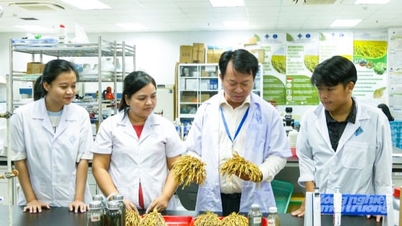

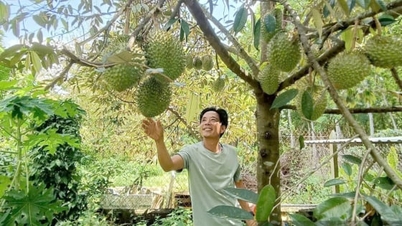





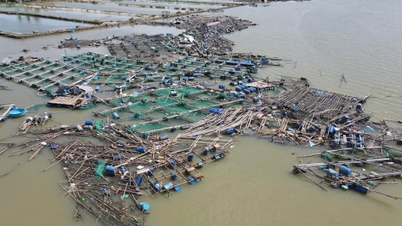
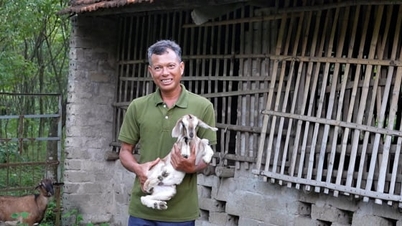
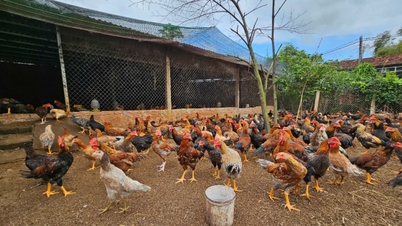

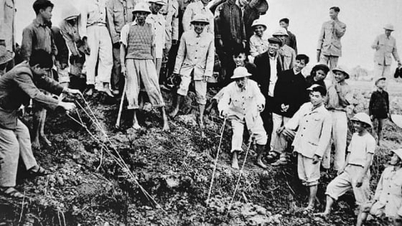


































































![Dong Nai OCOP transition: [Article 3] Linking tourism with OCOP product consumption](https://vphoto.vietnam.vn/thumb/402x226/vietnam/resource/IMAGE/2025/11/10/1762739199309_1324-2740-7_n-162543_981.jpeg)






Comment (0)